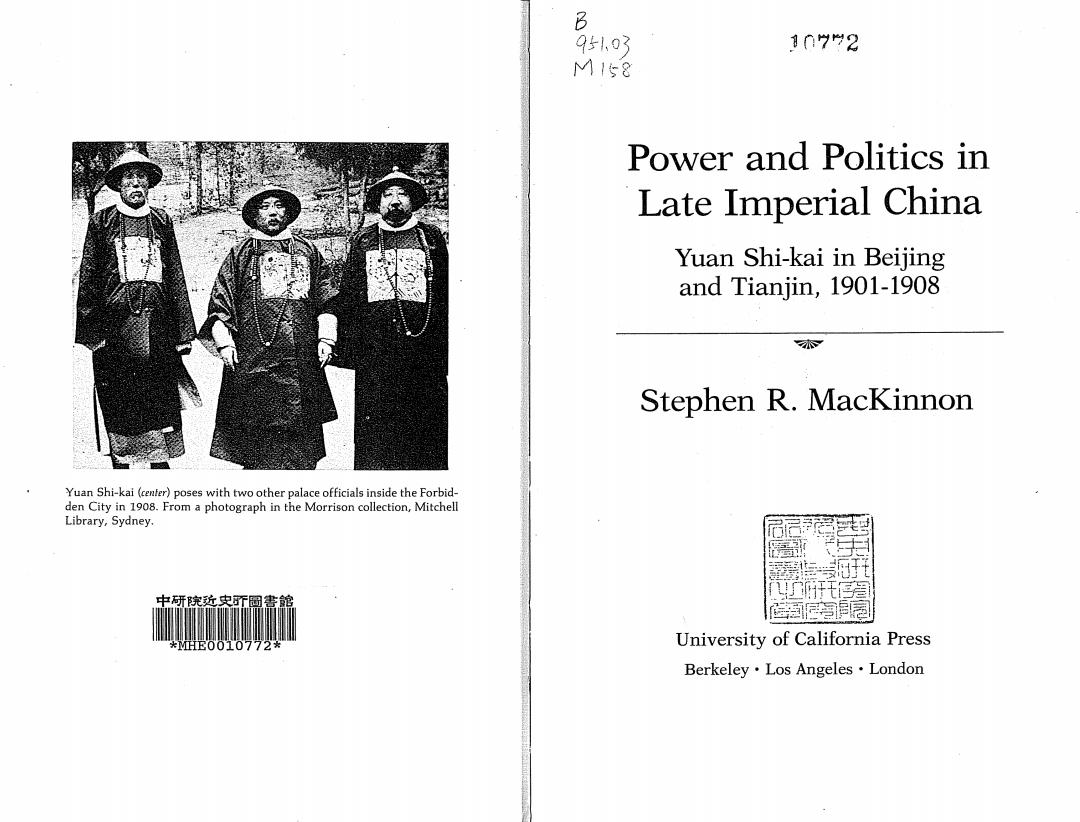
B 951.03 1072 M158 Power and Politics in Late Imperial China Yuan Shi-kai in Beijing and Tianjin,1901-1908 Stephen R.MacKinnon Yuan Shi-kai (cenfer)poses with two other palace officials inside the Forbid- den City in 1908.From a photograph in the Morrison collection,Mitchell Library,Sydney. ; 中研院近史骄圖害館 *ME0010772* University of California Press Berkeley·Los Angeles·London
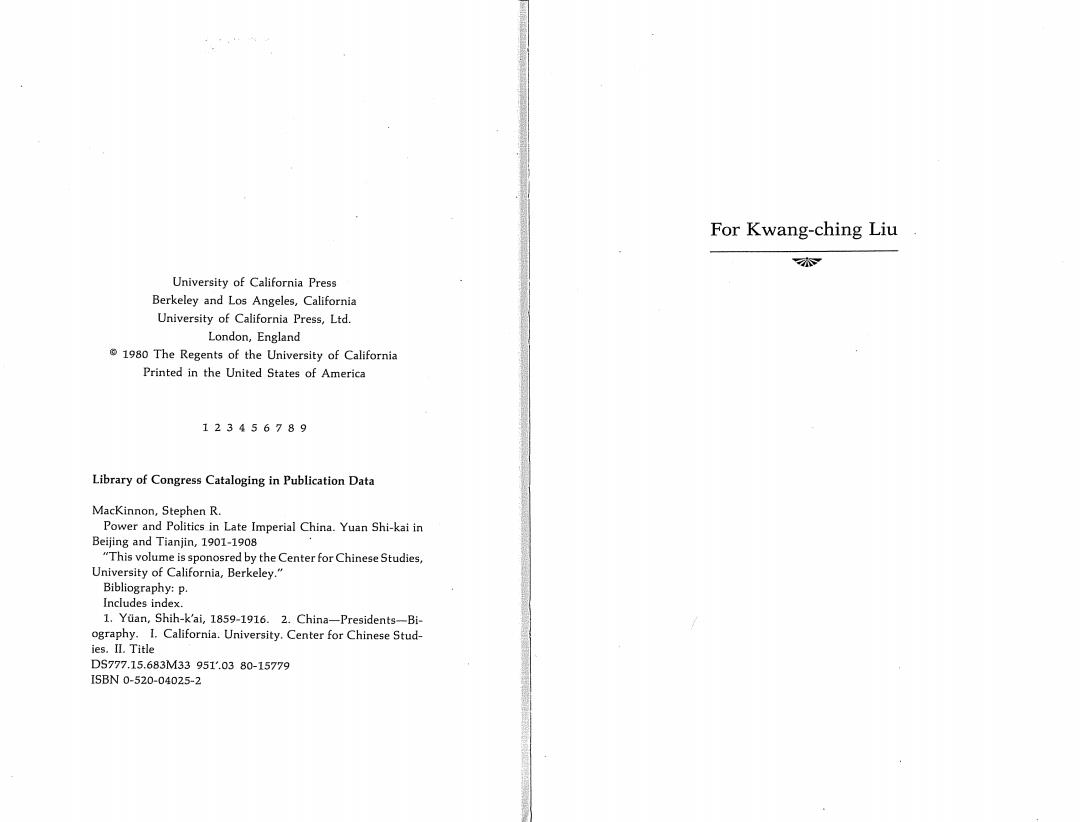
For Kwang-ching Liu University of California Press Berkeley and Los Angeles,California University of California Press,Ltd. London,England 1980 The Regents of the University of California Printed in the United States of America 123456789 Library of Congress Cataloging in Publication Data MacKinnon,Stephen R. Power and Politics in Late Imperial China.Yuan Shi-kai in Beijing and Tianjin,1901-1908 "This volume is sponosred by the Center for Chinese Studies, University of California,Berkeley." Bibliography:p. Includes index. 1.Yuan,Shih-k'ai,1859-1916.2.China-Presidents-Bi- ography.I.California.University.Center for Chinese Stud- ies.II.Title D5777.15.683M33951.0380-15779 ISBN0-520-04025-2
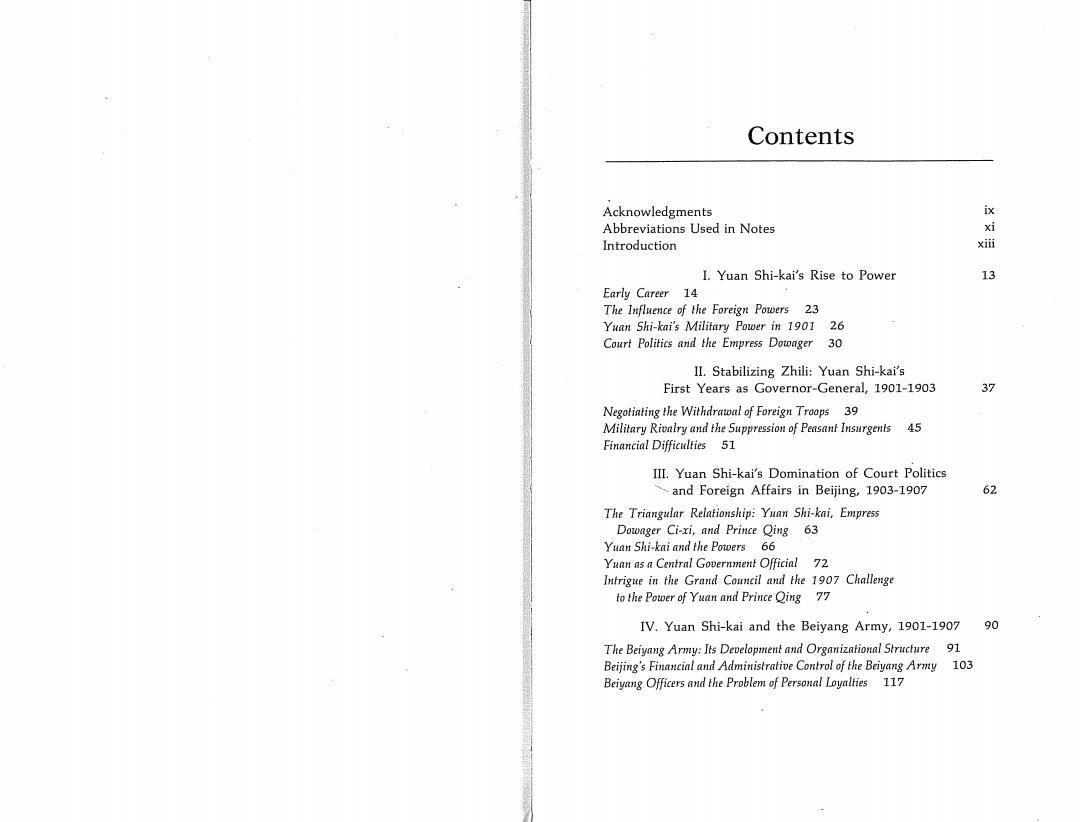
Contents Acknowledgments ix Abbreviations Used in Notes xi Introduction xi道 I.Yuan Shi-kai's Rise to Power 13 Early Career 14 The Influence of the Foreign Powers 23 Yuan Shi-kai's Military Power in 1901 26 Court Politics and the Empress Dowager 30 II.Stabilizing Zhili:Yuan Shi-kai's First Years as Governor-General,1901-1903 37 Negotiating the Withdrawal of Foreign Troops 39 Military Rionlry and the Suppression of Peasant Insurgents 45 Financial Difficulties 51 III.Yuan Shi-kai's Domination of Court Politics and Foreign Affairs in Beijing,1903-1907 62 The Triangular Relationship:Yuan Shi-kai,Empress Dowager Ci-xi,and Prince Qing 63 Yuan Shi-kai and the Powers 66 Yuan as a Central Government Official 72 Intrigue in the Grand Council and the 1907 Challenge to the Power of Yuan and Prince Qing 77 IV.Yuan Shi-kai and the Beiyang Army,1901-1907 90 The Beiyang Army:Its Development and Organizational Struchure 91 Beijing's Financial and Administrative Control of the Beiyang Army 103 Beiyang Officers and the Problem of Personal Loyalties 117
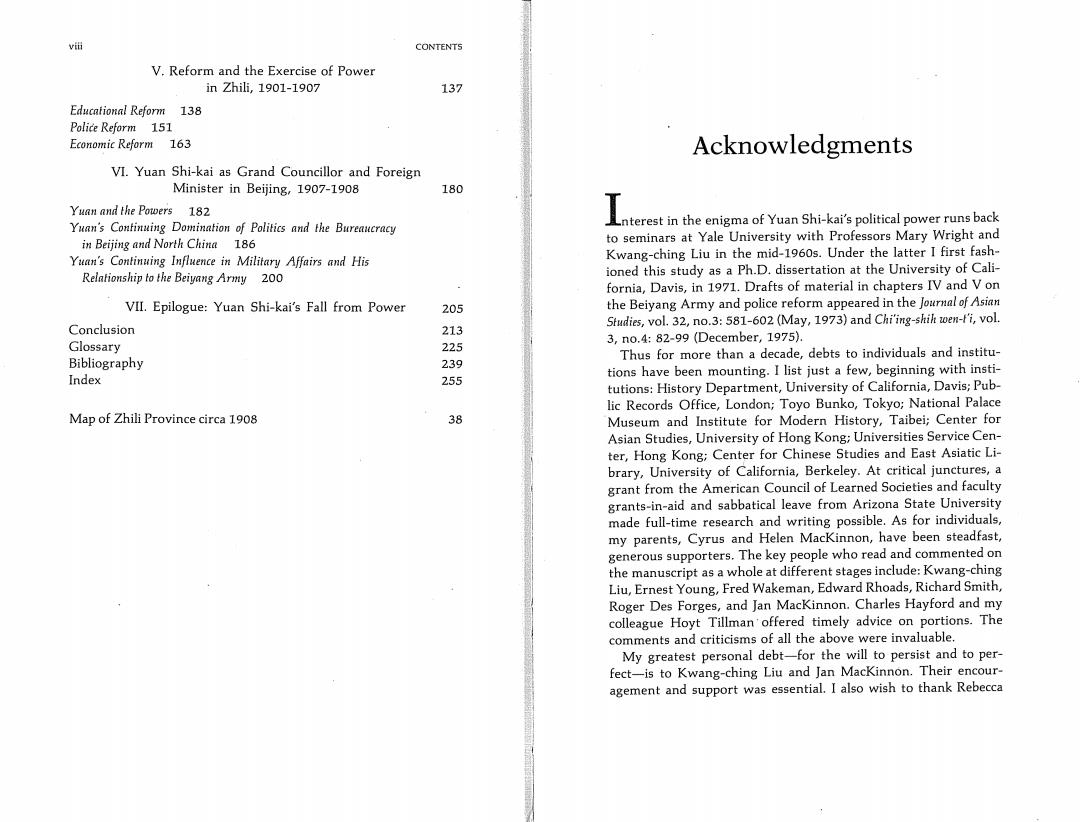
CONTENTS V.Reform and the Exercise of Power in Zhili,1901-1907 137 Educational Reform 138 Police Reform 151 Economic Reform 163 Acknowledgments VI.Yuan Shi-kai as Grand Councillor and Foreign Minister in Beijing,1907-1908 180 Yuan and the Powers 182 Yuan's Continuing Domination of Politics and the Bureaucracy _nterest in the enigma of Yuan Shi-kai's political power runs back in Beijing and North China 186 to seminars at Yale University with Professors Mary Wright and Yuan's Continuing Influence in Military Affairs and His Kwang-ching Liu in the mid-1960s.Under the latter I first fash- Relntionship to the Beiyang Army 200 ioned this study as a Ph.D.dissertation at the University of Cali- fornia,Davis,in 1971.Drafts of material in chapters IV and V on VII.Epilogue:Yuan Shi-kai's Fall from Power 205 the Beiyang Army and police reform appeared in the Journal of Asian Studies,vol.32,no.3:581-602(May,1973)and Chi'ing-shik wen-I'i,vol. Conclusion 213 Glossary 225 3,no.4:82-99(December,1975). Bibliography 239 Thus for more than a decade,debts to individuals and institu- Index tions have been mounting.I list just a few,beginning with insti- 255 tutions:History Department,University of California,Davis;Pub- lic Records Office,London;Toyo Bunko,Tokyo;National Palace Map of Zhili Province circa 1908 38 Museum and Institute for Modern History,Taibei;Center for Asian Studies,University of Hong Kong;Universities Service Cen- ter,Hong Kong;Center for Chinese Studies and East Asiatic Li- brary,University of California,Berkeley.At critical junctures,a grant from the American Council of Learned Societies and faculty grants-in-aid and sabbatical leave from Arizona State University made full-time research and writing possible.As for individuals, my parents,Cyrus and Helen MacKinnon,have been steadfast, generous supporters.The key people who read and commented on the manuscript as a whole at different stages include:Kwang-ching Liu,Ernest Young,Fred Wakeman,Edward Rhoads,Richard Smith, Roger Des Forges,and Jan MacKinnon.Charles Hayford and my colleague Hoyt Tillman'offered timely advice on portions.The comments and criticisms of all the above were invaluable. My greatest personal debt-for the will to persist and to per- fect-is to Kwang-ching Liu and Jan MacKinnon.Their encour- agement and support was essential.I also wish to thank Rebecca
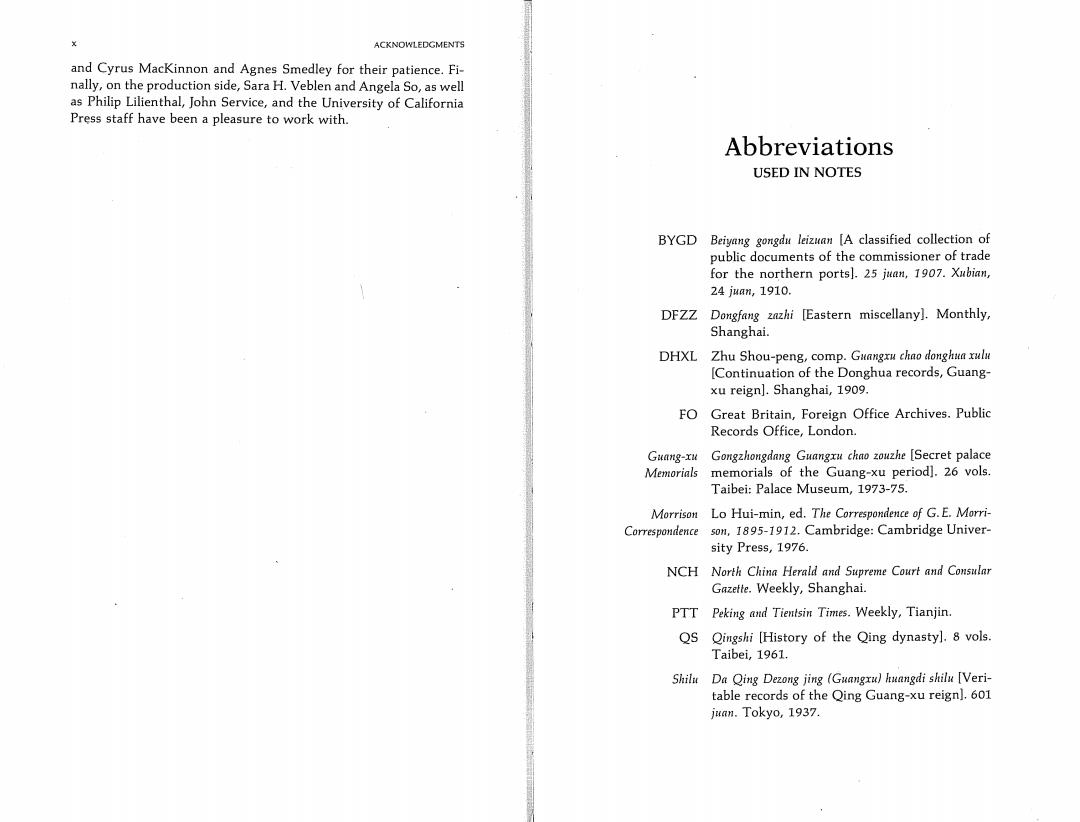
ACKNOWLEDGMENTS and Cyrus MacKinnon and Agnes Smedley for their patience.Fi- nally,on the production side,Sara H.Veblen and Angela So,as well as Philip Lilienthal,John Service,and the University of California Press staff have been a pleasure to work with. Abbreviations USED IN NOTES BYGD Beiyang gongdu leizuan [A classified collection of public documents of the commissioner of trade for the northern ports].25 juan,1907.Xubian, 24j4an,1910. DFZZ Dongfang zazhi [Eastern miscellany].Monthly, Shanghai. DHXL Zhu Shou-peng,comp.Guangxu chao donghun xulu [Continuation of the Donghua records,Guang- xu reign].Shanghai,1909. FO Great Britain,Foreign Office Archives.Public Records Office,London. Guang-xu Gongzhongdang Guangxu chao zouzhe [Secret palace Memorials memorials of the Guang-xu period].26 vols. Taibei:Palace Museum,1973-75. Morrison Lo Hui-min,ed.The Correspondence of G.E.Morri- Correspondence son,1895-1912.Cambridge:Cambridge Univer- sity Press,1976. NCH North China Herald and Supreme Court and Consular Gazelte.Weekly,Shanghai. PTT Peking and Tientsin Times.Weekly,Tianjin. QS Qingshi [History of the Qing dynastyl.8 vols. Taibei,1961. Shilu Da Qing Dezong jing (Guangxu)huangdi shiln [Veri- table records of the Qing Guang-xu reign].601 juan.Tokyo,1937
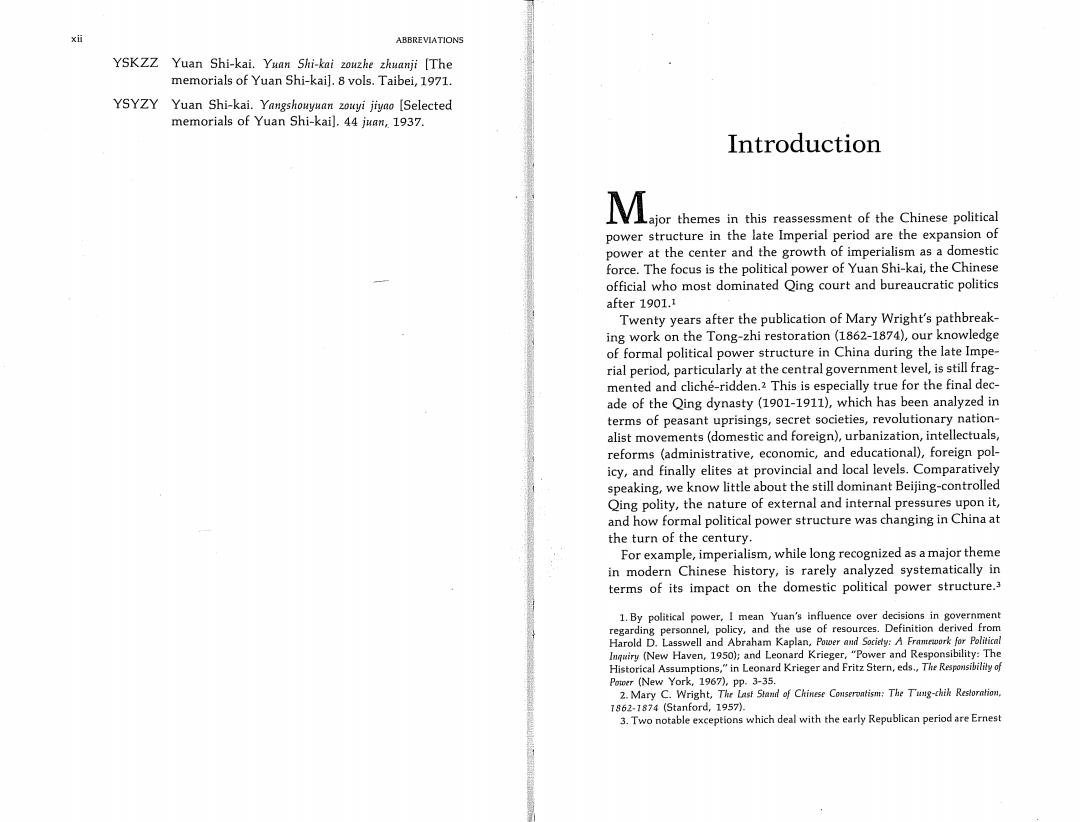
ABBREVIATIONS YSKZZ Yuan Shi-kai.Yuan Shi-kai zouzhe zkuanji [The memorials of Yuan Shi-kai].8 vols.Taibei,1971. YSYZY Yuan Shi-kai.Yangshouyuan zouyi jiyao [Selected memorials of Yuan Shi-kai].44 juan,1937. Introduction themes in this reassessment of the Chinese political power structure in the late Imperial period are the expansion of power at the center and the growth of imperialism as a domestic force.The focus is the political power of Yuan Shi-kai,the Chinese official who most dominated Qing court and bureaucratic politics after 1901.1 Twenty years after the publication of Mary Wright's pathbreak- ing work on the Tong-zhi restoration(1862-1874),our knowledge of formal political power structure in China during the late Impe- rial period,particularly at the central government level,is still frag- mented and cliche-ridden.2 This is especially true for the final dec- ade of the Qing dynasty(1901-1911),which has been analyzed in terms of peasant uprisings,secret societies,revolutionary nation- alist movements(domestic and foreign),urbanization,intellectuals, reforms(administrative,economic,and educational),foreign pol- icy,and finally elites at provincial and local levels.Comparatively speaking,we know little about the still dominant Beijing-controlled Qing polity,the nature of external and internal pressures upon it, and how formal political power structure was changing in China at the turn of the century. For example,imperialism,while long recognized as a major theme in modern Chinese history,is rarely analyzed systematically in terms of its impact on the domestic political power structure.3 1.By political power,I mean Yuan's influence over decisions in government regarding personnel,policy,and the use of resources.Definition derived from Harold D.Lasswell and Abraham Kaplan,Power and Sociely:A Frameork for Politiral Ingitiry (New Haven,1950);and Leonard Krieger,"Power and Responsibility:The Historical Assumptions,"in Leonard Krieger and Fritz Stern,eds.,The Responsibilily of Pomer (New York,1967),pp.3-35. 2.Mary C.Wright,Thr Lasf Stand of Chinese Comserontism:The Tuug-thik Reslorntion. 7862-1874(Stanford,1957). 3.Two notable exceptions which deal with the early Republican period are Ernest

2 POWER AND POLITICS IN LATE IMPERIAL CHINA INTRODUCTION 3 Scholars in the United States often argue that the destructive deed,there has been no systematic study of the impact of imperi- impact of Western and Japanese imperialism on China was more alism on late Imperial political power structure that I know of since psychological and intellectual than economic.They cite the lack of the pioneering works by Chinese scholars Hu Sheng and Shao evidence of significant foreign influence on the Chinese economy Xun-zheng.7 beyond treaty port centers,argue that foreign firms stimulated The facts of a rapidly accelerating Western and Japanese pres- rather than hindered the development efforts of Chinese capitalists ence in China,especially after 1900,are generally acknowledged. and government reformers,and emphasize the successes of the The trade deficit was serious.Foreign control over modern trans- dynasty in protecting Chinese legal sovereignty over territory and portation,heavy industry,and modern banking increased.The economic enterprises.They conclude that Chinese nationalism is influx of missionaries accelerated.Foreign residents of all kinds in better understood as an emotional and ideological reaction to im- China increased from 10,091 in 1895 to 163,827 by 1913,and perialism rather than as a political force precipitated by the realities foreign enterprises were up from 603 to 3,805 over the same of economic dependence.4 The counterargument strongly asserts period.The British and their allies,the Japanese,were in the lead; the opposite:that there was increasing foreign penetration of the from 1902 to 1914,British investments jumped from 260.3 to 607.5 Chinese economy,that it had a seriously depressive-and disruptive million dollars (U.S.)and Japanese from near zero to 219.6 million effect generally,and that by means of financial subversion,Chi- dollars.8 nese control over the economy and territory steadily eroded.5 The By 1900 Western and Japanese imperialism had reached a new tangible and growing pressure of imperialism on late Qing polity, stage in China and generated a severe political crisis.In the 1894-95 while noticed in passing by both sides,is rarely brought seriously Sino-Japanese War,the central government lost most of its navy, into such debates.This is all the more surprising considering recent sovereignty over Taiwan,and suzerainty over Korea.Five years interest in the West in dependency theory (or the history of the later,in response to the Boxer peasant uprising and siege of foreign development of underdevelopment),which in Chinese studies has legations in 1900,a joint expeditionary force(including Russians, led to calls for a better understanding of the impact of foreign Germans,British,Americans,and Japanese)occupied and sacked penetration on the Chinese state in the late Imperial period.o In- Beijing and Tianjin,driving the Court into exile.In the process most of what was left of the central government's ground forces P.Young.The Presidency of Yun Skik-kai:Liberalism and Dictatorskip in Early Republican China(Ann Arbor,1976)and Edward Friedman,Backwnrd Townrd Revolution:The Chinese were destroyed.Moreover,a heavy indemnity (450 million taels) Revolutionary Parly (Berkeley and Los Angeles,1974). was demanded by the powers which was over four times the size of 4.For a sophisticated statement of this argument in summary form,see Rhoads Beijing's annual budget,forcing the central government to forfeit Murphy,The Outsiders:The Westeru Experience in India and Chrinn (Ann Arbor,1977),as well as such representative works as Hou Chi-ming,Forrign Inaeshmicnls nnd Eromomic its annual "native customs"revenues in payment.Militarily and Development in Ching,1840-1937 (Cambridge,Mass.,1965);John Schrecker,Imperialism financially,Beijing was left defenseless by the Boxer affair. and Chinese Natiounlism:Germany in Skantung (Cambridge,Mass.,1971);and Albert Not well understood is the profound extent to which imperialism Feuerwerker.The Foreign Establishment in Chin in the Early Twentieth Century (Ann Arbor, 1976). affected late Qing political power structure during the post-Boxer 5.Yan Zhong-ping,Zhongguo mian fangzhi shigo (Beijing,1955),is a representative decade.Besides mortgaging away the central government,the work of this school;for a succinct,up-to-date statement in English of the argument, Boxer Uprising and the resulting Allied occupation of Beijing and see Jean Chesneaux and Marianne Bastid,China from thte Opinmr Wars to the 1911 Revolmtionr (New York,1976).For summaries of the debate itself,see exchanges in dependency theory are Charles K.Wilbur,ed.,Politicnl Economry of Deeelopmen "Imperialism in China,"Bulletin of Concerited Asian 5chtolars 4.4 (December 1972):2-16, Uadendedelopment (New York,1973),and Andre G.Frank,Capitalism and Underdevelop as well as"Symposium on China's Economic History,"Modera Chin 4.3 (July 1978): ment in Lntin Americn (New York,1967). 251-369.A middle position of course is possible;see,for example,Edward J.M. Rhoads,in Chinn's Republicnn Reoolution:The Case of Kunghrg.1895-1913(Cambridge, 7.Hu Sheng.Diguozlyi ya Zhonggio zhengzhi (Hong Kong,1948),translated as Imperialism and Chinese Politics (Beijing,1955);and Shao Xun-zheng."Xinhai geming Ma5s.,1975). qian wushi nian waiguo qinlue zhe he zhongguo maibanhua junfa guanliao shili di 6.Victor Lippit,"The Development of Underdevelopment in China,"Morern China guanxi,"Lishi yamjin (August 1954):53-64. 4.3(July 1978):280-84,and comments by Carl Riskin,ibin pp.364-66.Two classics of 8.Hou Chi-ming,p.225
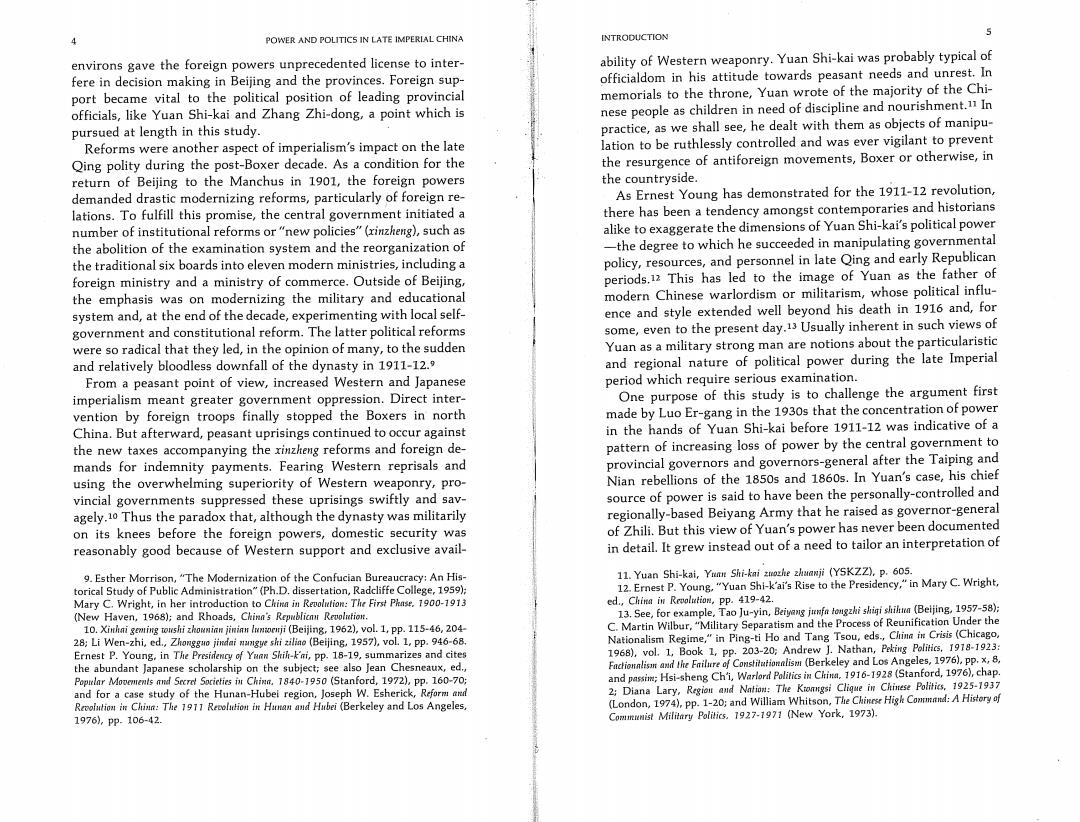
5 POWER AND POLITICS IN LATE IMPERIAL CHINA INTRODUCTION environs gave the foreign powers unprecedented license to inter- ability of Western weaponry.Yuan Shi-kai was probably typical of fere in decision making in Beijing and the provinces.Foreign sup- officialdom in his attitude towards peasant needs and unrest.In port became vital to the political position of leading provincial memorials to the throne,Yuan wrote of the majority of the Chi- officials,like Yuan Shi-kai and Zhang Zhi-dong,a point which is nese people as children in need of discipline and nourishment.11 In pursued at length in this study practice,as we shall see,he dealt with them as objects of manipu- Reforms were another aspect of imperialism's impact on the late lation to be ruthlessly controlled and was ever vigilant to prevent Qing polity during the post-Boxer decade.As a condition for the the resurgence of antiforeign movements,Boxer or otherwise,in return of Beijing to the Manchus in 1901,the foreign powers the countryside. demanded drastic modernizing reforms,particularly of foreign re- As Ernest Young has demonstrated for the 1911-12 revolution, lations.To fulfill this promise,the central government initiated a there has been a tendency amongst contemporaries and historians number of institutional reforms or "new policies"(xinzheng),such as alike to exaggerate the dimensions of Yuan Shi-kai's political power the abolition of the examination system and the reorganization of -the degree to which he succeeded in manipulating governmental the traditional six boards into eleven modern ministries,including a policy,resources,and personnel in late Qing and early Republican foreign ministry and a ministry of commerce.Outside of Beijing, periods.12 This has led to the image of Yuan as the father of the emphasis was on modernizing the military and educational modern Chinese warlordism or militarism,whose political influ- system and,at the end of the decade,experimenting with local self- ence and style extended well beyond his death in 1916 and,for government and constitutional reform.The latter political reforms some,even to the present day.13 Usually inherent in such views of were so radical that they led,in the opinion of many,to the sudden Yuan as a military strong man are notions about the particularistic and relatively bloodless downfall of the dynasty in 1911-12. and regional nature of political power during the late Imperial From a peasant point of view,increased Western and Japanese period which require serious examination. imperialism meant greater government oppression.Direct inter- One purpose of this study is to challenge the argument first vention by foreign troops finally stopped the Boxers in north made by Luo Er-gang in the 1930s that the concentration of power China.But afterward,peasant uprisings continued to occur against in the hands of Yuan Shi-kai before 1911-12 was indicative of a the new taxes accompanying the xinzheng reforms and foreign de- pattern of increasing loss of power by the central government to mands for indemnity payments.Fearing Western reprisals and provincial governors and governors-general after the Taiping and using the overwhelming superiority of Western weaponry,pro- Nian rebellions of the 1850s and 1860s.In Yuan's case,his chief vincial governments suppressed these uprisings swiftly and sav- source of power is said to have been the personally-controlled and agely.10 Thus the paradox that,although the dynasty was militarily regionally-based Beiyang Army that he raised as governor-general on its knees before the foreign powers,domestic security was of Zhili.But this view of Yuan's power has never been documented reasonably good because of Western support and exclusive avail- in detail.It grew instead out of a need to tailor an interpretation of 9.Esther Morrison,"The Modernization of the Confucian Bureaucracy:An His- 11.Yuan Shi-kai,Ynmt Siti-kai zmozhe zhuawji (Y5KZZ),p.605. torical Study of Public Administration"(Ph.D.dissertation,Radcliffe College,1959); 12.Ernest P.Young,"Yuan Shi-k'ai's Rise to the Presidency,"in Mary C.Wright, Mary C.Wright,in her introduction to China in Reuolntion:The First Phase.1900-1913 ed.,China in Revolution,pp.419-42. (New Haven,1968);and Rhoads,Chinn's Republicmt Reuplntiont. 13.See,for example,Tao Ju-yin,Beiyang jumfn longzisiis(Beijing,1957-58); 10.Xinhai geming tonshi zhowmian jinian Iwmioerji (Beijing,1962),vol.1,pp.115-46,204- C.Martin Wilbur,"Military Separatism and the Process of Reunification Under the 28 Li Wen-zhi,ed.,Zhongguo jindai mg sh ilin(Beijing,1957),vol.1,pp.946-68. Nationalism Regime,"in Ping-ti Ho and Tang Tsou,eds.,China in Crisis (Chicago, Ernest P.Young,in The Presidency of Yuan Shih-kmi,pp.18-19,summarizes and cites 1968),vol.1,Book 1,pp.203-20;Andrew J.Nathan,Peking Politics.1918-1923: the abundant Japanese scholarship on the subject;see also Jean Chesneaux,ed., Facionalisn and Ihe Fnilure of Constitutionelism (Berkeley and Los Angeles,1976),pp.x,8 Poprelar Movements md Srcrel Sorieties in Chimn.1840-1950 (Stanford,1972),pp.160-70: and passim;Hsi-sheng Ch'i,Warlord Politics in China.1916-1928(Stanford,1976),chap and for a case study of the Hunan-Hubei region,Joseph W.Esherick,Reform ad 2;Diana Lary,Region and Nation:The Kiomtgsi Clique in Chinese Politics,1925-1937 Reooiution in Chian:The 1911 Recolution in Hantan and Hubei (Berkeley and Los Angeles, (London,1974),pp.1-20;and William Whitson,The Chinese High Command:A History of 1976),pp.106-42. Communist Military Polilics.1927-1971 (New York,1973)
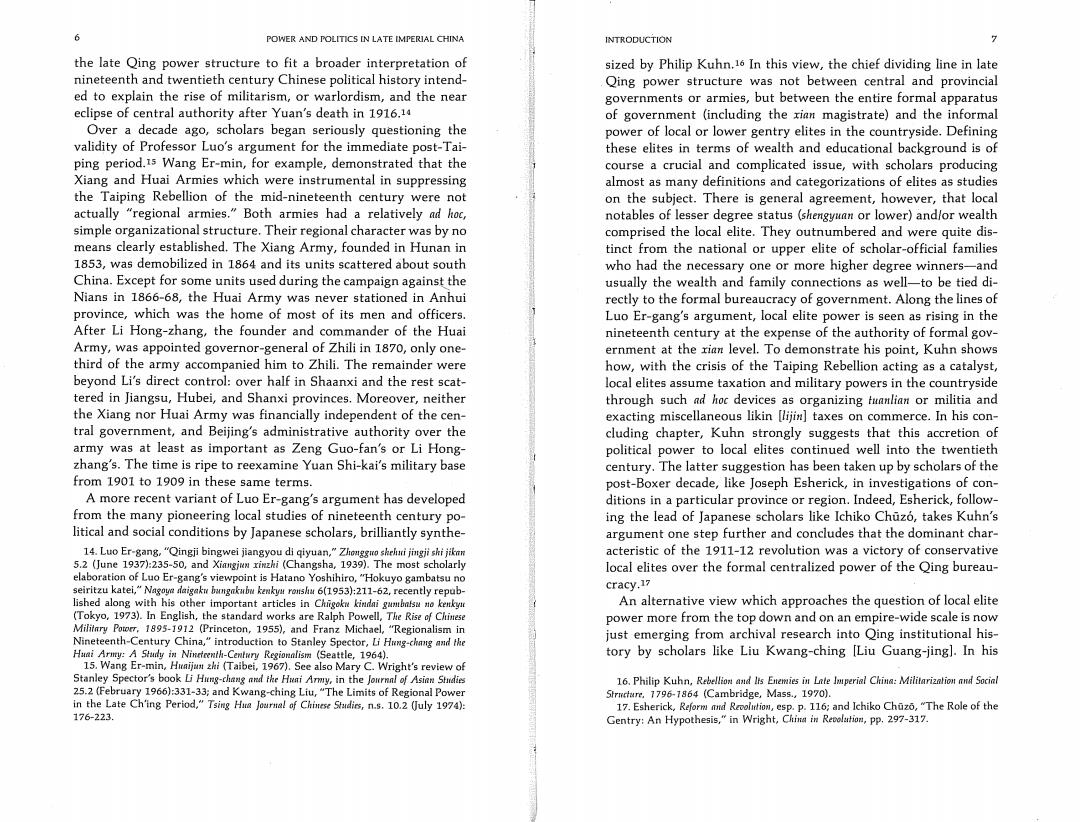
POWER AND POLITICS IN LATE IMPERIAL CHINA INTRODUCTION 7 the late Qing power structure to fit a broader interpretation of sized by Philip Kuhn.16 In this view,the chief dividing line in late nineteenth and twentieth century Chinese political history intend- Qing power structure was not between central and provincial ed to explain the rise of militarism,or warlordism,and the near governments or armies,but between the entire formal apparatus eclipse of central authority after Yuan's death in 1916.14 of government (including the xian magistrate)and the informal Over a decade ago,scholars began seriously questioning the power of local or lower gentry elites in the countryside.Defining validity of Professor Luo's argument for the immediate post-Tai- these elites in terms of wealth and educational background is of ping period.15 Wang Er-min,for example,demonstrated that the course a crucial and complicated issue,with scholars producing Xiang and Huai Armies which were instrumental in suppressing almost as many definitions and categorizations of elites as studies the Taiping Rebellion of the mid-nineteenth century were not on the subject.There is general agreement,however,that local actually "regional armies."Both armies had a relatively ad koc, notables of lesser degree status(shengyuan or lower)andlor wealth simple organizational structure.Their regional character was by no comprised the local elite.They outnumbered and were quite dis- means clearly established.The Xiang Army,founded in Hunan in tinct from the national or upper elite of scholar-official families 1853,was demobilized in 1864 and its units scattered about south who had the necessary one or more higher degree winners-and China.Except for some units used during the campaign against the usually the wealth and family connections as well-to be tied di- Nians in 1866-68,the Huai Army was never stationed in Anhui rectly to the formal bureaucracy of government.Along the lines of province,which was the home of most of its men and officers. Luo Er-gang's argument,local elite power is seen as rising in the After Li Hong-zhang,the founder and commander of the Huai nineteenth century at the expense of the authority of formal gov- Army,was appointed governor-general of Zhili in 1870,only one- ernment at the xian level.To demonstrate his point,Kuhn shows third of the army accompanied him to Zhili.The remainder were how,with the crisis of the Taiping Rebellion acting as a catalyst, beyond Li's direct control:over half in Shaanxi and the rest scat- local elites assume taxation and military powers in the countryside tered in Jiangsu,Hubei,and Shanxi provinces.Moreover,neither through such ad hoc devices as organizing tuanlian or militia and the Xiang nor Huai Army was financially independent of the cen- exacting miscellaneous likin [lijin]taxes on commerce.In his con- tral government,and Beijing's administrative authority over the cluding chapter,Kuhn strongly suggests that this accretion of army was at least as important as Zeng Guo-fan's or Li Hong- political power to local elites continued well into the twentieth zhang's.The time is ripe to reexamine Yuan Shi-kai's military base century.The latter suggestion has been taken up by scholars of the from 1901 to 1909 in these same terms. post-Boxer decade,like Joseph Esherick,in investigations of con- A more recent variant of Luo Er-gang's argument has developed ditions in a particular province or region.Indeed,Esherick,follow- from the many pioneering local studies of nineteenth century po- ing the lead of Japanese scholars like Ichiko Chuzo,takes Kuhn's litical and social conditions by Japanese scholars,brilliantly synthe- argument one step further and concludes that the dominant char- 14.Luo Er-gang,"Qingji bingwei jiangyou di qiyuan,"Zhomgguo shi jings acteristic of the 1911-12 revolution was a victory of conservative 5.2 (June 1937):235-50,and XimtgiNN xinzki (Changsha,1939).The most scholarly local elites over the formal centralized power of the Qing bureau- elaboration of Luo Er-gang's viewpoint is Hatano Yoshihiro,"Hokuyo gambatsu no seiritzu katei,"Nagoya daigakn bungakubu kenkyu ronshu 6(1953):211-62,recently repub- cracy.17 lished along with his other important articles in Chiigokn kindai gumbnfs no kenkyi An alternative view which approaches the question of local elite (Tokyo,1973).In English,the standard works are Ralph Powell,The Rise of Chinese power more from the top down and on an empire-wide scale is now Military Potorr,1895-1912 (Princeton,1955),and Franz Michael,"Regionalism in Nineteenth-Century China,"introduction to Stanley Spector,Li Hung-chang and the just emerging from archival research into Qing institutional his- Huai Army:A Study in Nincicenth-Century Regionalism (Seattle,1964). tory by scholars like Liu Kwang-ching [Liu Guang-jing].In his 15.Wang Er-min,Hunijun zhi (Taibei,1967).See also Mary C.Wright's review of Stanley Spector's book Li Hung-chang and ihe Huai Armry,in the Journnl of Asinn Studies 16.Philip Kuhn,Rebellion and Its Enemies in Late Imperial China:Militarizalion and Socinl 25.2(February 1966):331-33;and Kwang-ching Liu,"The Limits of Regional Power Struciure.1796-1864(Cambridge,Mass.,1970). in the Late Ch'ing Period,"Tsing Ha Joural of Chinese Sadies,n.s.10.2 (July 1974): 17.Esherick,Reform ad Reoolution,esp.p.116;and Ichiko Chuzo,"The Role of the 176-223. Gentry:An Hypothesis,"in Wright,China in Revolation,pp.297-317
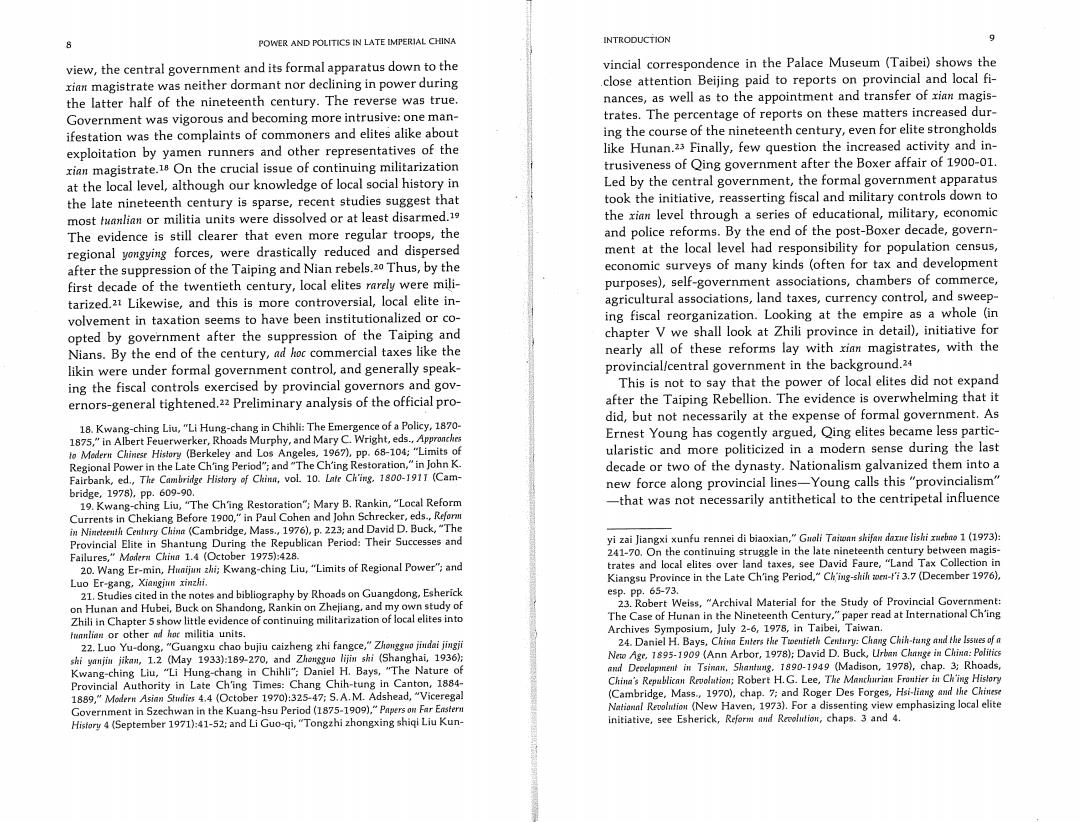
POWER AND POLITICS IN LATE IMPERIAL CHINA INTRODUCTION 9 view,the central government and its formal apparatus down to the vincial correspondence in the Palace Museum (Taibei)shows the xian magistrate was neither dormant nor declining in power during close attention Beijing paid to reports on provincial and local fi- the latter half of the nineteenth century.The reverse was true. nances,as well as to the appointment and transfer of xian magis- Government was vigorous and becoming more intrusive:one man- trates.The percentage of reports on these matters increased dur- ifestation was the complaints of commoners and elites alike about ing the course of the nineteenth century,even for elite strongholds exploitation by yamen runners and other representatives of the like Hunan.23 Finally,few question the increased activity and in- xian magistrate.18 On the crucial issue of continuing militarization trusiveness of Qing government after the Boxer affair of 1900-01. at the local level,although our knowledge of local social history in Led by the central government,the formal government apparatus the late nineteenth century is sparse,recent studies suggest that took the initiative,reasserting fiscal and military controls down to most tuanlian or militia units were dissolved or at least disarmed.19 the xian level through a series of educational,military,economic The evidence is still clearer that even more regular troops,the and police reforms.By the end of the post-Boxer decade,govern- regional yongying forces,were drastically reduced and dispersed ment at the local level had responsibility for population census, after the suppression of the Taiping and Nian rebels.20 Thus,by the economic surveys of many kinds (often for tax and development first decade of the twentieth century,local elites rarely were mili- purposes),self-government associations,chambers of commerce, tarized.21 Likewise,and this is more controversial,local elite in- agricultural associations,land taxes,currency control,and sweep- volvement in taxation seems to have been institutionalized or co- ing fiscal reorganization.Looking at the empire as a whole (in opted by government after the suppression of the Taiping and chapter V we shall look at Zhili province in detail),initiative for Nians.By the end of the century,ad hoc commercial taxes like the nearly all of these reforms lay with xian magistrates,with the likin were under formal government control,and generally speak- provincial/central government in the background.24 ing the fiscal controls exercised by provincial governors and gov- This is not to say that the power of local elites did not expand ernors-general tightened.22 Preliminary analysis of the official pro- after the Taiping Rebellion.The evidence is overwhelming that it did,but not necessarily at the expense of formal government.As 18.Kwang-ching Liu,"Li Hung-chang in Chihli:The Emergence of a Policy,1870- 1875,"in Albert Feuerwerker,Rhoads Murphy,and Mary C.Wright,eds..Appronches Ernest Young has cogently argued,Qing elites became less partic- to Modern Chinesr History (Berkeley and Los Angeles,1967),pp.68-104;"Limits of ularistic and more politicized in a modern sense during the last Regional Power in the Late Ch'ing Period";and"The Ch'ing Restoration,"in John K. decade or two of the dynasty.Nationalism galvanized them into a Fairbank,ed.,The Cambridge History of Ckinn,vol.10.Late Ch'ing.1800-191I (Cam- bridge,1978),Pp.609-90. new force along provincial lines-Young calls this "provincialism" 19.Kwang-ching Liu,"The Ch'ing Restoration";Mary B.Rankin,"Local Reform -that was not necessarily antithetical to the centripetal influence Currents in Chekiang Before 1900,"in Paul Cohen and John Schrecker,eds.,Reform in Nineternth Cenlrry Chime (Cambridge,Mass.,1976),p.223;and David D.Buck,"The Provincial Elite in Shantung During the Republican Period:Their Successes and yi zai Jiangxi xunfu rennei di biaoxian,"Guoli Taitonn skifan daxie lishi xuebno 1(1973): Failures,"Morera Chinn 1.4 (October 1975):428. 241-70.On the continuing struggle in the late nineteenth century between magis- 20.Wang Er-min,Huaiju zi;Kwang-ching Liu,"Limits of Regional Power";and trates and local elites over land taxes,see David Faure,"Land Tax Collection in Luo Er-gang,Xiangjnn xinzhi. Kiangsu Province in the Late Ch'ing Period,"Ch'ing-shill iom-i 3.7 (December 1976), 21.Studies cited in the notes and bibliography by Rhoads on Guangdong,Esherick esP.Pp.65-73. on Hunan and Hubei,Buck on Shandong,Rankin on Zhejiang,and my own study of 23.Robert Weiss,"Archival Material for the Study of Provincial Government: Zhili in Chapter 5 show little evidence of continuing militarization of local elites into The Case of Hunan in the Nineteenth Century,"paper read at International Ch'ing fomlian or other ad hor militia units. Archives Symposium,July 2-6,1978,in Taibei,Taiwan. 22.Luo Yu-dong,"Guangxu chao bujiu caizheng zhi fangce,"Zhonggno jindai jingji 24.Daniel H.Bays,Chrina Enters the Toenith Centry:Chang Chih-tung d tessef shi yanjin jikan,1.2 (May 1933):189-270,and Zhongguo lijin shi (Shanghai,1936); Neto Age,1895-1909 (Ann Arbor,1978);David D.Buck,Urban Chnnge in Clrima:Politics Kwang-ching Liu,"Li Hung-chang in Chihli";Daniel H.Bays,"The Nature of andDeeelopent in Tsinm.Shaniung.1890-1949 (Madison,1978),chap.3;Rhoads, Provincial Authority in Late Ch'ing Times:Chang Chih-tung in Canton,1884- China's Republicnn Revolution;Robert H.G.Lee,The Mancinrrimnt Fromtier in Ch'ing Hislory 1889,"Modernt Asian Stdies 4.4 (October 1970):325-47;S.A.M.Adshead,"Viceregal (Cambridge,Mass.,1970),chap.7;and Roger Des Forges,Hsi-linng and lhe Chinese Government in Szechwan in the Kuang-hsu Period (1875-1909),"Papers on Far Enstern National Reoltion (New Haven,1973).For a dissenting view emphasizing local elite Hisfory 4(September 1971):41-52;and Li Guo-qi,"Tongzhi zhongxing shiqi Liu Kun- initiative,see Esherick,Reform nud Recolution,chaps.3 and 4